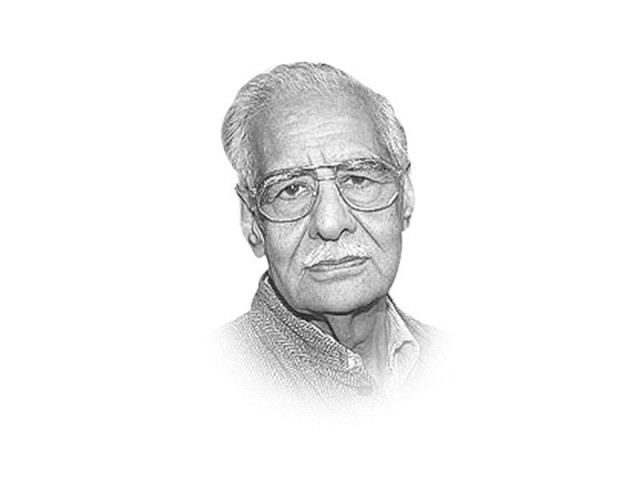A trumped up charge
The government has been using sedition laws to silence dissenting voices

The writer is a syndicated columnist and a former member of India’s Rajya Sabha
I think it is a trumped up charge. Radhika and her husband, Prannoy Roy, are not that type because they are self-made people. They may have committed some technical errors. But the CBI has registered a case against RRPR Holding Private Limited, Prannoy Roy, Radhika and unidentified officials of ICICI Bank of criminal conspiracy, cheating and corruption.
According to charges, the RRPR Holdings had allegedly taken a loan of Rs500 crore from India Bulls Private Limited to purchase 20 per cent shares of NDTV from the public. The CBI has alleged that RRPR Holdings took a loan of Rs375 crore at the rate of 19 per cent per annum from ICICI Bank to repay the borrowing from India Bulls. The promoters of NDTV pledged their entire shareholding in NDTV as collateral to ICICI for this loan, it is alleged.
According to the investigating agency, this pledging of shares was not reported to the SEBI, stock exchanges and the information and broadcasting ministry. Such concealment was allegedly done as a creation of more than 61 per cent voting capital which was in violation of section 19 (2) of the Banking Regulation Act. It should not be more than 30 per cent, the agency said. An interest waiver of 10 per cent was also given by ICICI.
The network has said that the loans have been repaid and it produced a document that appeared to confirm its claim. “NDTV and its promoters have never defaulted on any loan to ICICI or any other bank.” read a statement posted on NDTV’s website. “We adhere to the highest levels of integrity and independence. It is clearly the independence and fearlessness of NDTV’s team that the ruling party’s politicians cannot stomach and the CBI raid is merely another attempt at silencing the media.”
The Narendra Modi government has been after NDTV for quite some time because this is one of the very few channels which have not surrendered to the whims of the government. And this is not the first time that it has been targeted by the Modi government. Last year, NDTV had to challenge the government’s one-day ban of its Hindi channel in the Supreme Court when it was ordered off the air for broadcasting sensitive details of terror attack on the air force base in Pathankot in January 2016.

In November 2016, the information and broadcasting ministry had ordered an unprecedented 24-hour blackout against the network, saying its coverage on terrorist attacks at Pathankot had revealed “strategically-sensitive information.” NDTV argued that its coverage was based on official news briefings and that other broadcasters that had made the same revelations were not being penalised.
Subsequently, the representatives of NDTV met the information and broadcasting minister and pleaded that the channel had not been given a fair chance to offer evidence that it did not share any information that was different from what other channels and newspapers presented at the same time. Understandably, the ban was widely condemned by journalists and editors with all press councils drawing parallels to the Emergency of the 1970s when basic constitutional rights including the freedom of the press were blatantly violated. At the last minute, the government lifted the ban.
The Editors’ Guild of India then said that the one-day ban by the government was unprecedented and that the centre appeared to have given itself the power “to intervene in the functioning of the media and take arbitrary punitive action as and when it does not agree with the coverage.” Defending the ban, Information and Broadcasting Minister Venkaiah Naidu said that it was “in the interest of the country’s security” and that the barrage of criticism confronted by the government appeared to be “politically inspired.”
Even on the recent raids by CBI, Naidu’s reaction is, more or less, the same. Denying that there was no political interference on the raids, Naidu has said: “If somebody does something wrong, simply because they belong to media, you cannot expect the government to keep quiet.” He said that the law was taking its course.
I am not against the law taking its own course. But I, like other journalists, would want to know what the channel has done to invite the wrath of the government or, for that matter, Prime Minister Modi. It is obvious that this action could not have been taken without consent from the top. The information and broadcasting minister is only the hatchet person. After all, he would have to carry out the orders coming from above.
The government has been using sedition laws to silence dissenting voices. And over 51 freedom of information activists have been found murdered since the law came into force in 2005. NDTV’s news coverage has riled up members of Modi’s Hindu nationalist BJP, many of whom accuse the network of being anti-BJP. Days before the raid, an NDTV news anchor had sparred with the BJP’s national spokesman Sambit Patra on air and asked him to leave her show for his accusation that NDTV had an “agenda.”
On the one hand, Modi talks of strengthening democracy. But on the other hand, he is doing everything to weaken it. In his favourite ‘Mann Ki Baat,’ Modi said the other day that for a lively democracy, healthy criticisms are immensely important. However, every action emanating from his government, particularly the attacks on the media, smacks of authoritarianism. The magic he casts on the people is gradually vanishing. The sooner he realises the better it would be for him and his supporters.
Published in The Express Tribune, June 10th, 2017.
Like Opinion & Editorial on Facebook, follow @ETOpEd on Twitter to receive all updates on all our daily pieces.















COMMENTS
Comments are moderated and generally will be posted if they are on-topic and not abusive.
For more information, please see our Comments FAQ